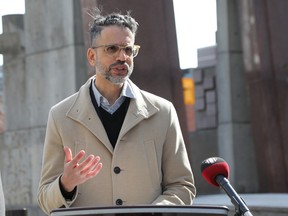Plaintiffs have filed an amended statement of claim, claiming the board is giving “preferential treatment” to pro-police delegates while blocking critics of the Ottawa Police Service and its board.
Article content
A lawsuit filed by six community groups against the Ottawa Police Services Board that accuses the oversight board of violating their freedom of expression will proceed to trial.
Yavar Hameed, a lawyer representing the groups, says a mandatory settlement conference between the police board and the community groups was not successful, and the matter will now proceed to trial in small claims court.
Advertisement 2
Article content
Article content
At a news conference Monday, Robin Browne of 613-819 Black Hub, said the groups have filed an amended statement of claim, claiming the board is giving “preferential treatment” to pro-police delegates while blocking critics of the Ottawa Police Service and its board from presenting at meetings.
Browne said if the police board is “serious in its commitment to addressing systemic racism and harm, then they should be open to hearing from everybody, especially those that highlight the harmful effects of policing on communities.”
The claims have not yet been tried in court and a date has not yet been set for the lawsuit.
Hameed said the board’s rules for delegates place a “heavy burden” on people from marginalized groups who want to present at the police board meetings, and “the question becomes if this board is simply window dressing or actually serves a democratic function.”
In February 2023, the board imposed a one-hour time limit on all public delegations at its monthly meetings, requiring presenters submit their remarks in writing ahead of the meeting. The board also said it would give priority to speakers who had not appeared in the previous three months.
Advertisement 3
Article content
The changes were designed, board members said at the time, to ensure they had the time to properly consider business items of their agenda, as well as to have more voices heard.
The rules came after months of friction between the police board and some of its most vocal critics, and the lawsuit argues the new rules violate community members’ right to freedom of expression.
Jeff Bradley of the Criminalization and Punishment Education Project said members of the organization regularly spoke at police board meetings since summer 2020, when global outrage about police misconduct hit a boiling point after a video of George Floyd being killed by Minneapolis police, as well as local examples of police violence. After the new rules were passed, though, “we saw a major decline in our members being able to continue speaking out on policing issues they experience,” Bradley said. “Our members feel defeated, burned out, disrespected by the Ottawa Police Services Board who continue systemic oppression by the police in another form through their own policies and processes.”
The board has denied that it is limiting its exposure to criticism from the public or restricting freedom of expression, arguing that it acted “in good faith” when putting new rules in place for members of the public who wish to address its meetings.
A request for comment from the board on Monday was not immediately acknowledged.
More to come.
Recommended from Editorial
-

Community groups sue police board to end controls on public delegations
-

Ottawa police board defends restrictions on public speakers
Article content




